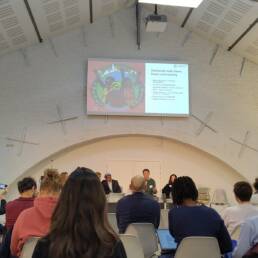Peace is a gift which God entrusts to human responsibility, to be fostered through dialogue and respect for the rights of all, through reconciliation and through forgiveness
Pope Benedict XVI
On the occasion of the International Day of Peace, Caritas Africa and Caritas Europa call attention to the multiple aspects of social exclusion that are persistent drivers of conflict in many African countries. We emphasize the importance of core civic freedoms that must apply to all residents and urge African and European leaders to take all necessary steps to protect these fundamental rights.
Social inequality and the concentration of economic and political power in the hands of a few ruling elites are at the heart of instability in many African countries. Specific population groups are marginalised based on their ethnicity, geographical location or ways of living. Yet, political priorities are often established reflecting governments’ and transnational corporations’ own interests, at the expense of the rights, needs and aspirations of local populations, especially of those living in remote areas and of marginalised groups.
Impacted by extreme inequality, poverty and corruption and lacking a sense of social security, more and more people are engaging in political protests. The challenge, however, is that the civic space for making one’s voice heard is extremely limited and shrinking further. In many African countries, people aspire to create more opportunities for dialogue to contribute to the development of their societies. We regret to see that, in some places, people are risking their lives when trying to protect their country’s constitution, demand good governance and condemn corruption.
We reiterate that peace and social justice are pre-requisites to development; in their absence, regional, national and local systems to provide health, education, economic opportunities and justice are doomed to fail. As a result, communities risk facing a protracted state of insecurity and fragility. A sustainable peace can only be achieved where there is an open and inclusive space for dialogue.
Witnessing these patterns of exclusion, Caritas Africa and Caritas Europa are concerned about the closing civic space, the democratic backsliding and, in particular, the political backlash against specific groups of people and minorities. We cannot expect a lasting and durable peace if we do not build more just and equitable societies in which all residents can participate freely and equally.
We believe that the first step towards building sustainable peace is to tackle discrimination and recognise that all people deserve dignity, prosperity and a participatory role in peace processes, whether they are women, disabled, illiterate, migrants, indigenous, poor, young or old.
Maria Nyman, Secretary General of Caritas Europa
Hence, we stress that African governments must listen to and understand the concerns and demands of all people. They have a duty to empower those who are excluded and marginalised to participate in decision making and peace processes so that they can become change agents in their own societies.
Caritas calls on African leaders to uphold their international and domestic legal obligations to respect and enforce fundamental human rights and guarantee freedom of expression, association and assembly as well as the right to peaceful protest. We urge the Africa Union’s Peace and Security Council to better promote these democratic practices among Member States.
Peace, security and stability in Africa can only be achieved if, in everyday life, people can exercise their civic rights, are treated with dignity and have the space to contribute to better governance.
Albert Mashika, Executive Secretary of Caritas Africa
We equally call on the European Union to persevere as a global leader in human rights, democracy, and rule of law, including by ensuring that its international development initiatives prioritise local and indigenous populations’ rights and aspirations. In particular, we expect the European Commission to ensure that civil society actors from both continents have meaningful opportunities to input into the new EU-Africa partnership framework in the leadup to the 6th AU-EU summit, planned for early 2022. Only with proper space for dialogue can this initiative succeed in addressing social injustice, fostering social inclusion and contributing to sustainable peace.
More information
Luísa Fondello
International Cooperation Officer
Tel: +32 (0)2 235 03 93
lfondello@caritas.eu




